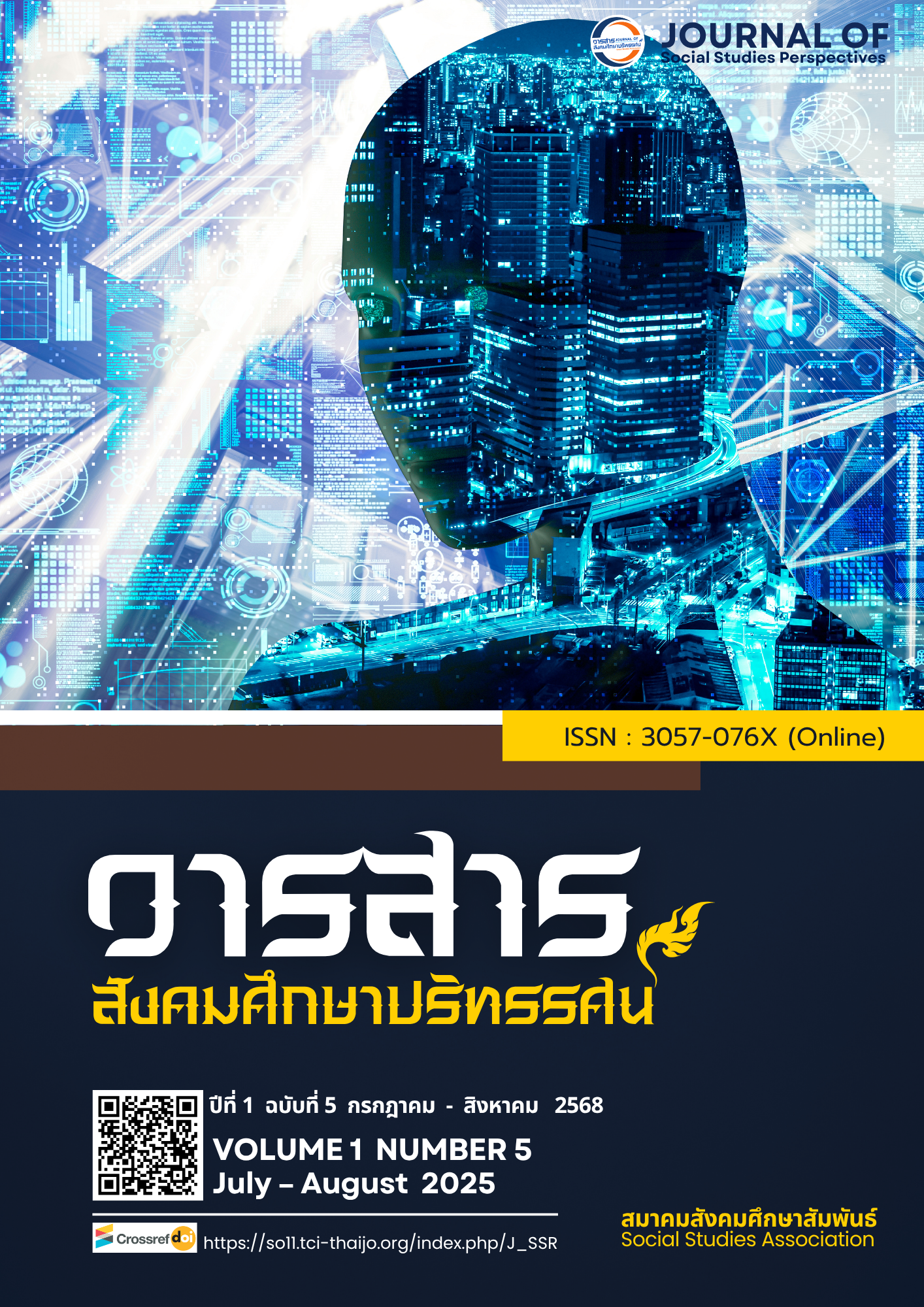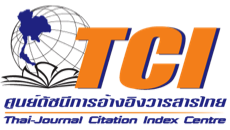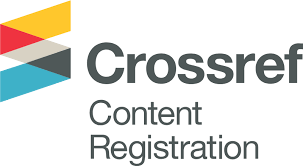องค์กรแห่งความสุขของครูในโลกยุคใหม่
DOI:
https://doi.org/10.64186/jsp1808คำสำคัญ:
องค์กรแห่งความสุข , ครูในโลกยุคใหม่ , ภาวะหมดไฟในการทำงานบทคัดย่อ
บทความวิชาการนี้มีวัตถุประสงค์เพื่อเสนอแนวทางการพัฒนาองค์กรแห่งความสุขสำหรับครูในโลกยุคใหม่เป็นแนวทางสำคัญในการยกระดับคุณภาพการศึกษา เพื่อช่วยลดภาวะหมดไฟในการทำงานของครู การดูแลสุขภาพทั้งทางร่างกายและจิตใจของครูถือเป็นปัจจัยสำคัญในการสร้างความสุขในการทำงาน ผ่านการนำเสนอมุมมองเกี่ยวกับ 1) ความสัมพันธ์ระหว่างความสุขของครูกับการพัฒนาการศึกษา 2) ปัญหาภาวะหมดไฟในการทำงาน และผลกระทบต่อการศึกษา 3) มุมมององค์กรแห่งความสุขอในสถานศึกษาต่างประเทศ 4) องค์ประกอบขององค์กรแห่งความสุข 5) แนวทางในการพัฒนาองค์กรแห่งความสุขของครูในสถานศึกษาของประเทศไทย โดยการถอดบทเรียนจากประเทศที่เป็นเลิศด้านการศึกษา ซึ่งให้ความสำคัญกับองค์กรแห่งความสุขของครู มุ่งเน้นไปที่การสร้างสภาพแวดล้อมที่สนับสนุนการพัฒนาและความสุขในการทำงานของครู ซึ่งจะส่งผลดีต่อประสิทธิภาพการสอนและคุณภาพการศึกษา ซึ่งจะทำให้ครูมีความสุขในการทำงานและส่งผลดีต่อการพัฒนาคุณภาพการศึกษาในประเทศไทยในระยะยาว
เอกสารอ้างอิง
Anantaworasakul, A. (2023). Burnout of Thai teachers: Solutions in the new era of education. EDUCA. https://www.educathai.com/knowledge/articles/999
Buntoonod, K., & Wanbanchet, W. (2025). Development of students' social and emotional skills. Journal of Social Studies Perspectives, 1(2), 62–71. https://so11.tci-thaijo.org/index.php/J_SSR/article/view/1257
Chaiphanphong, S. (2021). Leadership and ethics for administrators. Triple Education Co., Ltd.
Chaiyapanpong, S. (2021). Leadership and ethics for administrators (1st ed.). Triple Education.
Chutwat, C. (2023). Inequality in Thai society: Challenges and adaptation toward equality. Journal of Social Studies Perspectives, 1(1). https://so11.tci-thaijo.org/index.php/J_SSR/article/view/1154
Decha, D. (2023). Organization and development. Chulalongkorn University.
Department of Mental Health. (2021). Burnout syndrome: The condition of burnout in the workplace. https://dmh.go.th/news/view.asp?id=2445
Educational Equality Fund. (2023). Lessons learned from education reform: 'The key to equality.' Educational Equality Fund. https://www.eef.or.th/article-the-key-to-equality-finland-new-zealand-thailand/
Gallup, Inc. (2020). State of the global workplace: 2020 report. Gallup, Inc. https://www.gallup.com/workplace/283985/state-global-workplace-report-2020.aspx
Kamonthip, C. (2020). The happy workplace management in primary school. Suedu Journal, 18(2). Retrieved March 1, 2025, from https://so02.tci-thaijo.org/index.php/suedujournal/article/view/247247
Kanokwan, S. (2021). Learning management for emotional development... teachers and students are happy, and the classroom is happy. EDUCA. https://www.educathai.com/knowledge/articles/440
Maifaey, V. (2023). Hybrid educational management in the context of Thailand. Panyapiwat Journal, 15(2), 337–349. Retrieved March 1, 2025, from https://so05.tci-thaijo.org/index.php/pimjournal/article/view/255877
Ministry of Education. (2024). Education policy statement and the direction of the "Good Learning, Happy Learning" policy. https://moe360.blog/2023/09/14/minister-ed-statement-ed-policy/
OECD. (2020). TALIS 2018 results (Volume II): Teachers and school leaders as valued professionals. OECD Publishing. https://doi.org/10.1787/19cf08df-en
OECD. (2021). Teachers’ professional development: A policy perspective. Organisation for Economic Co-operation and Development.
Pannawasa, S. (2023). The Finnish education quality management. Journal of Graduate Studies Valaya Alongkorn Rajabhat University, 17(1), 245–257.
Pissawat, S. (2019). Lessons from Singapore: Strengthening school leadership – Success from good design (Part 1). EDUCA. https://www.educathai.com/knowledge/articles/418
Sakun, B. (2024). The Danish education model: 'Preparing children for the global society' - A challenge for Thai education. The Potential. https://thepotential.org/knowledge/danish-education/
Theertham, W., & team. (2016). 8 strategies to build a happiness organization. Bangkok: Decha Health Organization Center.
Uma, P., Subin, K., & Manawattanawong, A. (2022). The balance of teacher happiness. Institute for Population and Social Research,
Mahidol University. Retrieved March 1, 2025, from https://ipsr.mahidol.ac.th/wp-content/uploads/2022/03/Report-File529.pdf
UNICEF Thailand. (2019). No barriers to education: Best practices and lessons learned from education management for migrant children in Thailand. UNICEF Thailand. Retrieved March 1, 2025, from https://www.unicef.org/thailand/media/3701/file/pdf
Vachiryan, M. (2021). Factors affecting teacher burnout in schools under the secondary education area office, Bangkok metropolitan region 2. Master’s degree in Public Administration, Srinakharinwirot University.
Wayan, P. A. (2024). The effect of servant leadership, work ethics, organizational culture, and organizational commitment on teacher performance in state vocational high school in Denpasar. Pegem Journal of Education and Instruction, 14(1), 127–133.
World Health Organization. (2020). Leadership for health: WHO leadership development programme. World Health Organization. https://doi.org/10.1163/9789004636774_048
ดาวน์โหลด
เผยแพร่แล้ว
รูปแบบการอ้างอิง
ฉบับ
ประเภทบทความ
หมวดหมู่
สัญญาอนุญาต
ลิขสิทธิ์ (c) 2025 วารสารสังคมศึกษาปริทรรศน์

อนุญาตภายใต้เงื่อนไข Creative Commons Attribution-NonCommercial-NoDerivatives 4.0 International License.
บทความนี้ได้รับการเผยแพร่ภายใต้สัญญาอนุญาต Creative Commons Attribution-NonCommercial-NoDerivatives 4.0 International (CC BY-NC-ND 4.0) ซึ่งอนุญาตให้ผู้อื่นสามารถแชร์บทความได้โดยให้เครดิตผู้เขียนและห้ามนำไปใช้เพื่อการค้าหรือดัดแปลง หากต้องการใช้งานซ้ำในลักษณะอื่น ๆ หรือการเผยแพร่ซ้ำ จำเป็นต้องได้รับอนุญาตจากวารสาร










